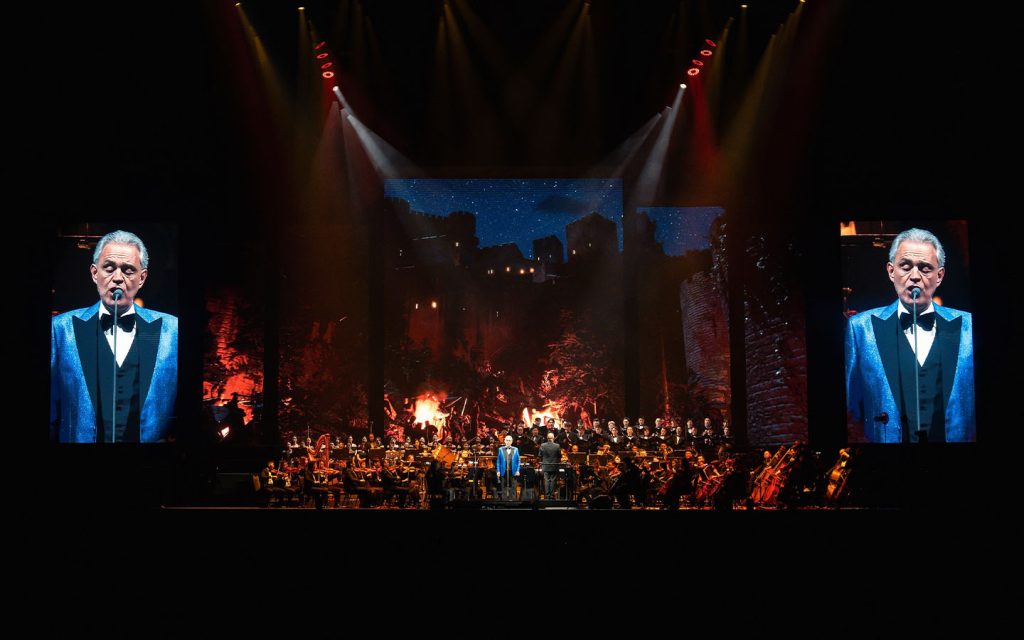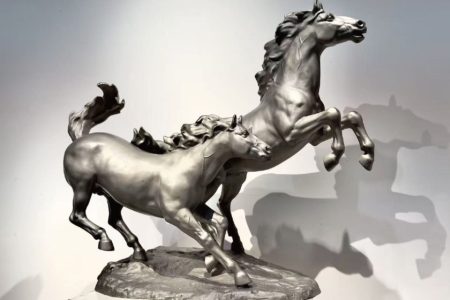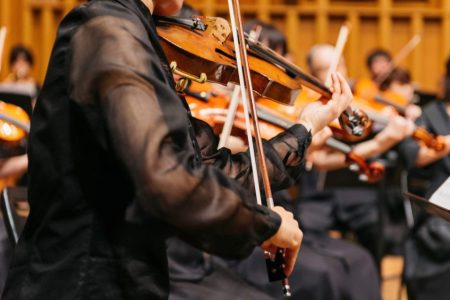With his extraordinary voice, Andrea Bocelli has captivated audiences around the globe, appealing to a diverse array of musical tastes. He draws different generations to his concerts, creating a unique connection with his fans of all ages.
The legendary Italian tenor’s recent performance at the Galaxy Arena in late March was his public debut concert in Macao (he gave a private performance at the inauguration of Wynn Palace in 2016). This much-anticipated night featured his son, Matteo Bocelli – a rising star in the classical crossover scene – as well as the Shenzhen Symphony Orchestra and the Shenzhen Opera under the baton of Carlo Bernini.
After the show, Andrea Bocelli shared with Macao News his thoughts on music, resilience, and hopes for the future.
This interview has been edited for clarity and length.
What were your expectations for your concert at Galaxy Arena?
A [Macao] debut, in the maturity of my career. It was a moment that I awaited with great interest and also with some trepidation. All the more reason to give it my all.
Your memoir, The Music of Silence, explores themes of resilience. Has there been a time when music helped you through a difficult period?
Music is a friend that accompanies you through life. All art is a gift from heaven for the promotion of the spirit and the propagation of goodness. Music has always been my overriding passion and has always been a medicine, a way to give lightness to life. In my early childhood, I had to undergo painful operations and spend long periods in hospital: the only real medicine that could distract me from so much pain, my parents said, was music. What hypnotised me were the voices of the great opera singers.
[See more: Five Macao Arts Festival shows you don’t want to miss]
Although my life in a way resembles a fairy tale with a happy ending, I must say that I achieved success when I was over 35, after so many missed opportunities, so many closed doors. The early 1990s were not short on sorrow, which was all the more burning because it came after such high hopes. Yet the enthusiasm for my greatest passion has never been lacking.
With over 90 million records sold, and performances for popes, presidents, and royalty, what’s still on your bucket list?
I do hope to be able to continue touring, as long as my physical fitness allows me to, precisely because I consider it essential to maintain a direct and intimate relationship with those who have the goodness to appreciate the fruit of my profession.
As a father, I would like to be able to hold my children’s children in my arms one day.
My greatest dream is, however, [to live in] a world without war, because war is always wrong.
As someone who has shaped classical crossover music for decades, how do you view the evolution of this genre and your role in its development?
I have a certain ambiguity about the term ‘crossover.’ Rather than mixing genres, in fact, I have always tried to put them side by side, performing operatic music in a context habitually devoted to pop, out of the desire to popularise opera and broaden its audience.
Although I often enjoy a lighter repertoire, from popular romance to song, I remain a tenor, an opera performer. Basically, I do what, in the past, artists such as Enrico Caruso or Beniamino Gigli did – [they were] people who made history in the way they interpreted opera but who also sang many popular romantic songs.
[See more: ‘Everyone can really relate to this play.’ Isabelle Huppert discusses Chekov with Macao News]
On the other hand, I agree that cross-pollination is an essential spark in the human evolutionary process: every time two differences cross paths, a small miracle happens and something new is born. The history of art is steeped in cross-pollination. Popular music and classical music have always found points of contact, drawing mutual creative profit.

Beyond talent, what values or disciplines do you believe are essential for a lasting career in music?
Everyone has a special talent. The difficulty is to recognise it, to understand what one is made for and to take responsibility for it, with seriousness, and also with willingness to make sacrifices.
Talent is of little use in itself because it must be corroborated by many other ingredients: ambition, humility, determination and, I repeat, a sense of sacrifice. One must be able to acquire good habits, be curious and know how to protect oneself from one’s own possible preconceptions.
The path of learning opera singing (as well as that of mastering a musical instrument) is undoubtedly a thorny one, because it is made up of dedication and even renunciation. But it is worth it, because it leads to what I have repeatedly called ‘the paradise of music.’
Collaboration has been a big part of your work, from duets with pop stars like Dua Lipa to symphonic performances. Which collaborations have left the deepest mark on you, and why?
Since the beginning of my career, I have had the good fortune to duet with great voices, to be guided by great conductors and to collaborate with great instrumentalists… The list is very long, from all of them I have learned something, from some, a great deal.
[See more: ‘I think I was born a musician’: Stacey Kent is returning to Macao]
With many, the professional empathy has then blossomed into true friendship – Luciano Pavarotti, Plácido Domingo, Céline Dion and others. In a way, it is precisely to document my artistic life, reflected in the voices of my extraordinary fellow travellers, that I conceived the recent double album entitled Duets.
In addition, the album includes artists such as Ed Sheeran, Sarah Brightman, Stevie Wonder, Jennifer Lopez, Laura Pausini, Giorgia, Christina Aguilera, Lang Lang, Ellie Goulding, Ariana Grande, Cecilia Bartoli… And of course, Dua Lipa: her voice is as expressive and lively as her interpretative intelligence… After all, it is never a coincidence that such a young artist is so successful!
Which artists do you listen to? If we peeked at your streaming history, which three tracks have you played most recently?
I remain primarily attached to the operatic repertoire and am fond of the interpretations of the golden age that took place during my childhood. I refer to the memorable voices of the great Franco Corelli (of whom I had the honour of being a pupil), Plácido Domingo, Luciano Pavarotti, but also Beniamino Gigli, Mario Del Monaco, Enrico Caruso, Giuseppe Di Stefano…
I also happen to listen to the [iconic artists] of the 20th century who made pop history, from Frank Sinatra, Paul Anka, to Tony Bennett and Stevie Wonder. Quality music always intrigues me, so I also listen with pleasure to new pop music on the radio, especially when I am in the car.






